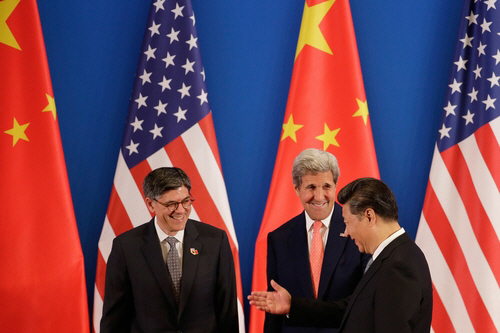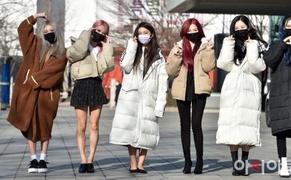By Hong Soon-do, Beijing correspondent, AsiaToday - China and the United States revealed their conflicts over North Korea's nuclear issue at the two-day U.S.-China Strategic and Economic Dialogue (S&ED), which was opened at Diaoyutai State Guest House in Beijing on June 6. At the opening ceremony attended by Chinese Vice Premier Wang Yang, State Council Yang Jiechi, US Treasury Secretary Jacob J. Lew and Secretary of State John Kerry, China called for deeper communication while the US highlighted its position that stronger sanctions are required to induce North Korea's surrender. Looking at the current situation, it seems almost impossible for both countries to reach an agreement.
 Chinese President Xi Jinping (right) greets US Treasury Secretary JackLew (left) and Secretary of State John Kerry at the joint opening ceremony ofthe eighth U.S.-China Strategic and Economic Dialogue (S&ED) held inDiaoyutai State Guest House in Beijing on June 6./ Source: Xinhua News Agency Chinese President Xi Jinping (right) greets US Treasury Secretary JackLew (left) and Secretary of State John Kerry at the joint opening ceremony ofthe eighth U.S.-China Strategic and Economic Dialogue (S&ED) held inDiaoyutai State Guest House in Beijing on June 6./ Source: Xinhua News Agency |
According to Western sources in Beijing on Monday, such tense disagreement was somewhat expected even before the opening of the Dialogue. This is because China rolled out the red carpet for Ri Su-yong, vice chairman of North Korea's ruling Workers' Party, when he visited Beijing on May 31 as a special envoy of North Korean leader Kim Jong-un, immediately raising U.S. concerns and speculations over China's position on the UN-led sanctions against North Korea.
This situation is clearly seen in Xi Jinping's speech at the joint opening ceremony of the Dialogue. "China and the United States are maintaining close communication and cooperation over regional and major global issues, including nuclear issues on the Korean Peninsula and Iranm," Xi said. This shows China's clear willingness for conversation rather than sanctions over North Korea's nuclear issue.
Of course, this brings concerns for the United States. In his speech at the opening ceremony, Kerry pressed China over North Korea, stating, "Washington and Beijing should continue to work together to tackle North Korea's nuclear issue. It is imperative to keep the pressure on North Korea and take all actions."
It seems hard for both countries to overcome differences on the last day of the Dialogue. Besides, it's highly likely that both countries will show grave differences of opinions concerning South China Sea, RMB exchange rate, trade conflicts, diplomacy and security, human rights, and cyber hacking issues. However, they could near agreement on regional and global issues such as climate change. This is highly likely as Xi said, "The key is not to adopt a confrontational attitude toward any differences. Some differences cannot be solved at the moment and both sides should take each other's actual situations into consideration and take a constructive approach."
Most Read
-
1
-
2
-
3
-
4
-
5
-
6
-
7





















